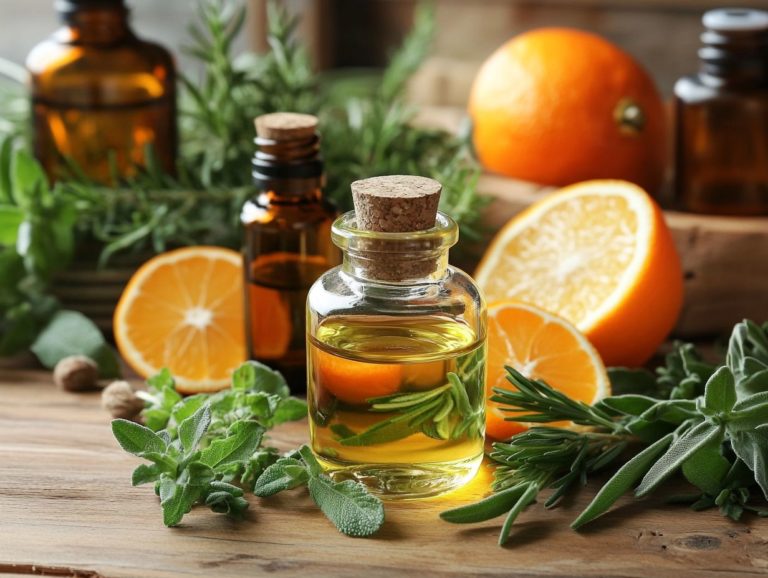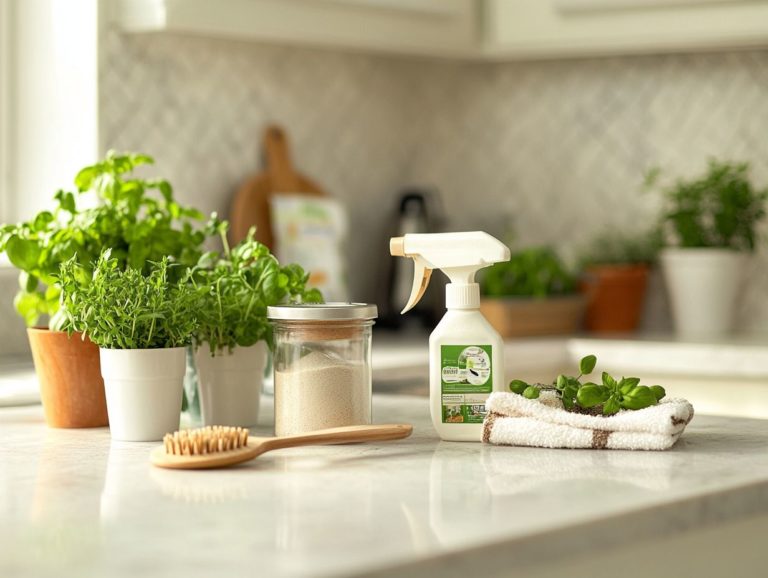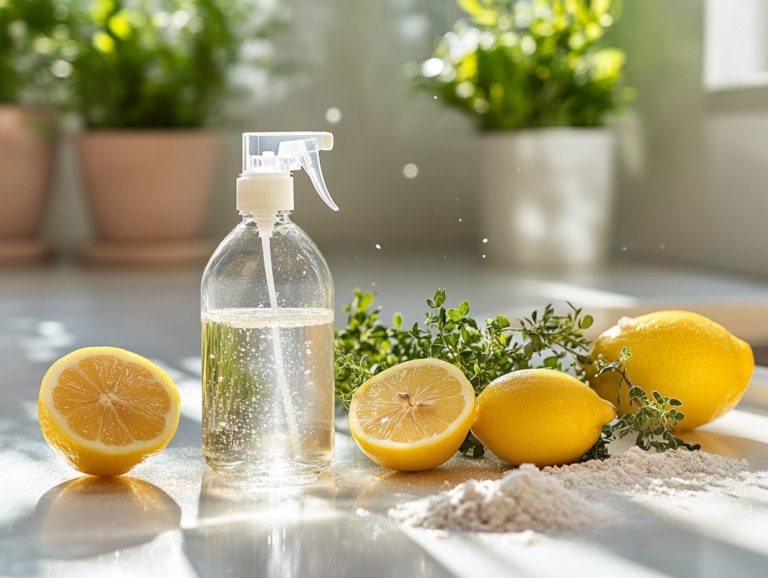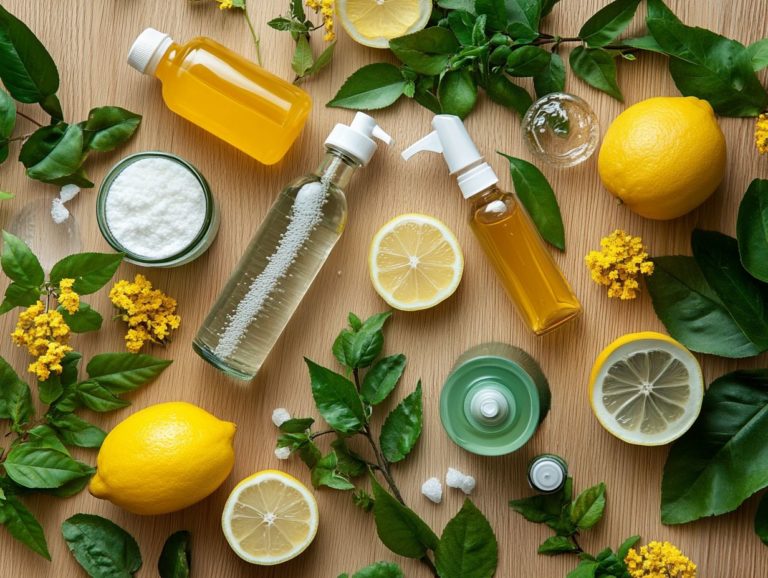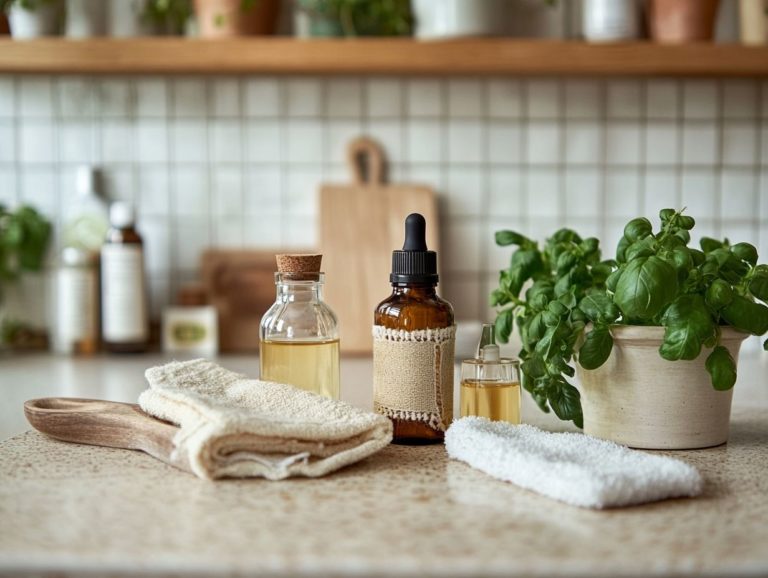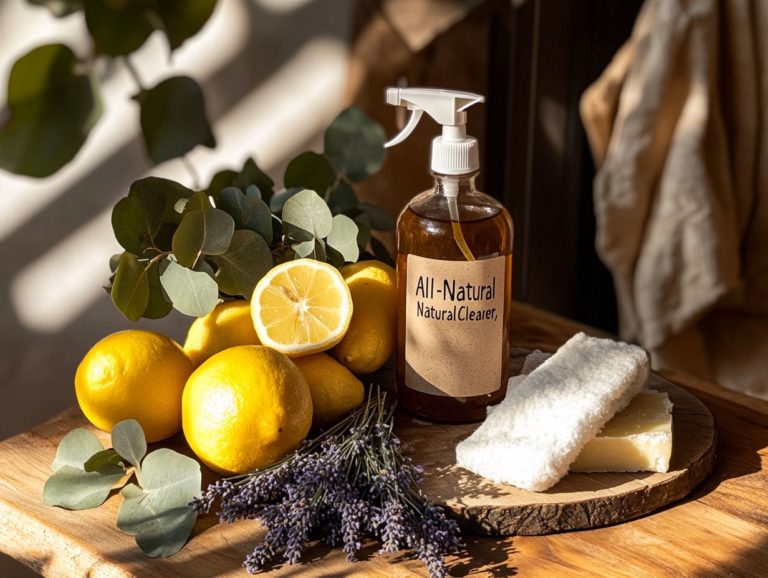The Effectiveness of Natural Cleaners vs. Chemicals
In today s world, where health and environmental awareness hold significant value, choosing between natural and chemical cleaners becomes an essential decision.
This article delves into what truly defines natural cleaners, highlighting their myriad benefits and contrasting them with traditional chemical options. Discover how effective and safe these cleaners can be for your home and the planet!
Uncover the finest natural alternatives that will not only keep your space impeccably clean but also preserve your well-being and protect the planet.
Contents
- Key Takeaways:
- What Are Natural Cleaners?
- What Are Chemical Cleaners?
- How Do Natural Cleaners Compare to Chemical Cleaners?
- Environmental Impact
- What Are the Best Natural Cleaners to Use?
- Vinegar
- Baking Soda
- How Can You Make Your Own Natural Cleaners?
- Frequently Asked Questions
- What are natural cleaners?
- How do natural cleaners compare to chemical cleaners in terms of effectiveness?
- Are natural cleaners safer to use than chemical cleaners?
- Why should I choose natural cleaners over chemical cleaners?
- Can natural cleaners be just as effective in killing germs and bacteria?
- Do natural cleaners cost more than chemical cleaners?
Key Takeaways:
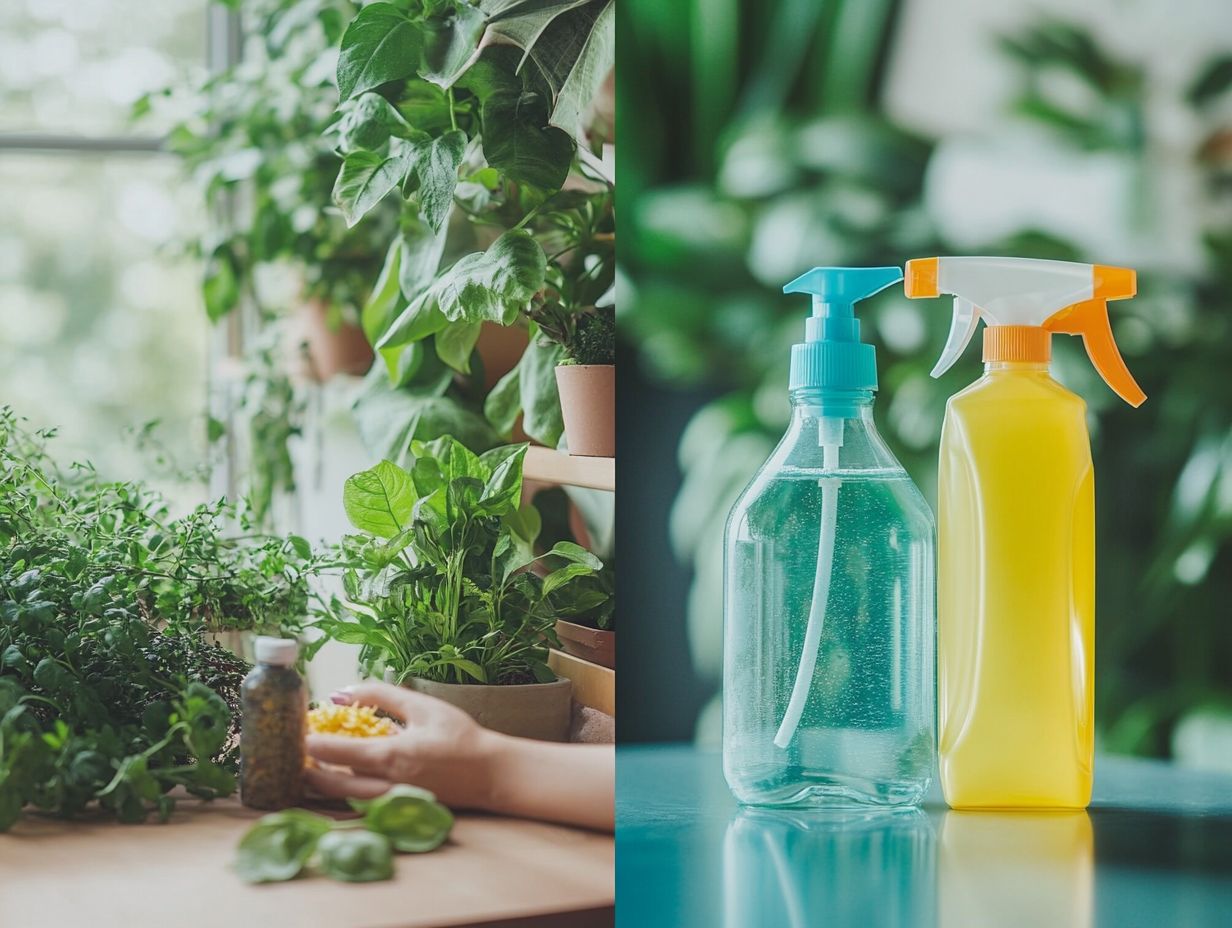
- Natural cleaners are effective and safe alternatives to chemical cleaners.
- Chemical cleaners pose potential health risks and harm to the environment.
- Vinegar, baking soda, lemon juice, and essential oils are some of the best natural cleaners to use.
What Are Natural Cleaners?
Natural cleaners are crafted primarily from plant-based ingredients and are free from the harsh chemicals often found in traditional cleaning products. These eco-friendly alternatives offer a safer solution, addressing the health risks tied to chemical disinfectants and chemicals that can evaporate into the air and may affect our health.
Experts like C cile Bascoul, PhD, along with organizations such as the Environmental Working Group, champion ingredient transparency. They highlight the importance of being informed about the efficacy and safety of the cleaning products you select.
What Are the Benefits of Using Natural Cleaners?
Using natural cleaners presents a wealth of benefits, primarily designed to enhance your health and safety while also minimizing your environmental footprint. Natural cleaners embrace plant-based ingredients that pose fewer health risks to you and your community.
With greater transparency in their ingredients, you gain a clearer understanding of what you re bringing into your home, alleviating concerns about the long-term effects of chemical disinfectants. Numerous studies have demonstrated that opting for natural cleaners can significantly improve indoor air quality.
This is vital since indoor air can often be more polluted than the air outside. A 2018 study published in the Journal of Environmental Health revealed that households relying on chemical cleaners reported elevated levels of volatile organic compounds and allergens.
By making the switch to natural alternatives, you can reduce irritants, leading to fewer allergy flare-ups and respiratory issues, particularly for children and pets. Natural cleaners do not have the same toxic risks associated with accidental ingestion, creating a safer environment for your little ones and furry companions.
Choosing biodegradable ingredients helps reduce pollution, contributing to a healthier planet for everyone.
What Are Chemical Cleaners?
You may frequently rely on chemical cleaners, commonly known as conventional cleaning products, for their impressive effectiveness in banishing dirt and germs from your home. However, many of these products harbor harsh chemicals that can pose serious health risks, such as allergic reactions and respiratory issues.
Regulatory bodies, including the EPA, along with guidelines like California’s Prop 65, underscore the hazards linked to certain volatile organic compounds (VOCs) commonly found in these cleaners. These substances can impact not only your health but also the environment around you.
Start your journey to a healthier home today by trying natural cleaners!
What Are the Risks of Using Chemical Cleaners?
The use of chemical cleaners comes with several risks, primarily due to the harsh chemicals and harmful substances that can evaporate into the air. These substances pose serious health risks, including respiratory issues and long-term effects that often go unnoticed by consumers.
Research indicates that exposure to these chemicals can worsen asthma and contribute to other chronic health conditions. For example, a report from the American Thoracic Society revealed that prolonged use of cleaning products could lead to a decline in lung function comparable to smoking a pack of cigarettes daily.
Given these findings, new safety rules have been introduced, emphasizing consumer awareness initiatives designed to educate the public about these dangers. Campaigns now encourage you to read labels diligently and seek out alternatives that are free from harmful ingredients, fostering a healthier living environment for everyone.
As more people learn about the dangers of chemical cleaners, they are eagerly seeking out safe, eco-friendly alternatives, reflecting a growing commitment to health and sustainability.
How Do Natural Cleaners Compare to Chemical Cleaners?
When you compare natural cleaners to chemical cleaners, several important factors come into play, such as effectiveness, safety, and environmental impact. Conventional cleaning products may offer impressive immediate cleaning power, yet they frequently rely on harsh chemicals that can jeopardize safety and health.
On the other hand, natural cleaning products harness plant-based ingredients, which not only mitigate health risks but also promote environmental sustainability. Especially when backed by third-party certifications like Green Seal, these products emerge as the preferred choice for those who prioritize eco-conscious living.
Effectiveness
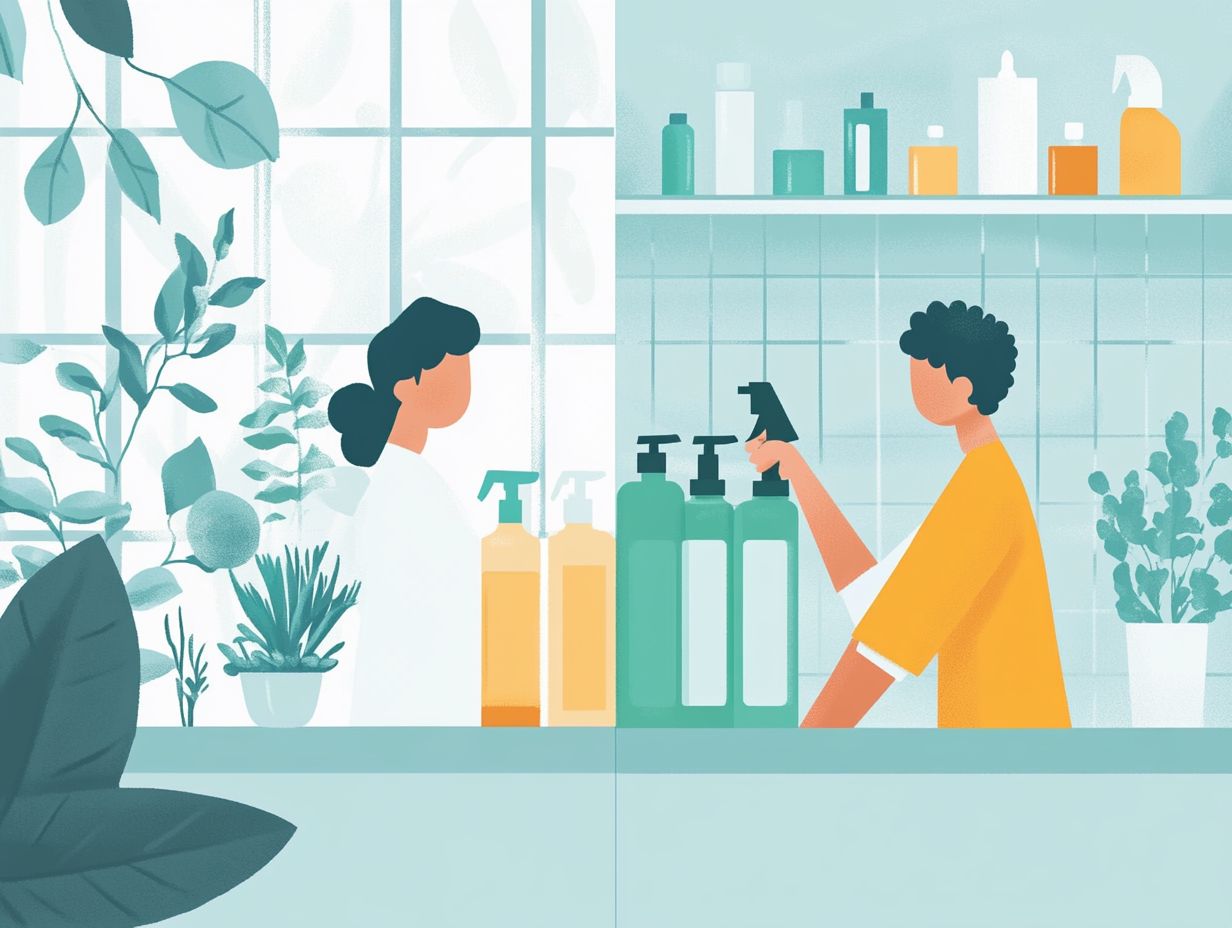
The effectiveness of cleaning products can vary dramatically between natural options and their conventional counterparts, especially in high-traffic areas that demand rigorous attention. While conventional cleaners often outshine their natural counterparts due to their potent chemical compositions, exciting new research shows that natural cleaners can now match the effectiveness of conventional ones.
Take, for instance, your kitchen and bathroom, where grease and grime tend to accumulate. Traditional cleaners may swiftly eliminate stubborn stains, but you might find that natural alternatives like vinegar and baking soda can tackle many of the same challenges when employed with a touch of strategy.
Recent advancements in cleaning science have led to the emergence of enzymatic cleaners, which are special cleaning products that use natural enzymes to break down dirt and stains. These innovations not only amplify the cleaning power of eco-friendly products but also allow you to use them with confidence across a range of scenarios, from removing tough stains on fabrics to neutralizing odors in carpets providing you with effective and safe solutions for a more sustainable cleaning routine.
Safety
Safety should be at the forefront of your mind when selecting cleaning products, particularly given the health risks associated with chemical disinfectants found in conventional options. Natural cleaning products often emphasize ingredient transparency, allowing you to see exactly what s in them. This transparency significantly reduces the chances of encountering adverse health effects commonly associated with harsh chemicals.
Using chemical cleaners can also raise valid concerns about indoor air quality, as harmful chemicals that can evaporate into the air may lead to respiratory issues and long-term health complications. Regulatory agencies like the Environmental Protection Agency (EPA) stress the importance of understanding the ingredients in these products and their potential impacts on both health and the environment.
By choosing natural alternatives, you not only mitigate risks related to health safety but also support a more transparent cleaning industry. As consumer awareness grows regarding these crucial factors, you are given the power to make informed choices that benefit both your personal health and ecological sustainability.
Environmental Impact
The environmental impact of cleaning products is crucial to consider, especially when weighing the benefits of eco-friendly cleaners against conventional options filled with harmful chemicals that can evaporate into the air. Natural cleaners typically have a reduced environmental footprint and align with sustainability practices. They often come with third-party certifications that ensure their eco-friendliness and ingredient transparency.
By choosing eco-friendly alternatives, you help minimize harmful emissions and promote healthier indoor air quality. These products use biodegradable ingredients that break down easily in the environment, reducing pollution and easing the burden on waste management systems.
Certifications like Green Seal or EcoLogo indicate that a product meets strict environmental standards, promoting responsible choices. Transparency regarding ingredients builds trust, enabling you to make informed decisions for a cleaner, greener lifestyle. Ultimately, this mindful approach benefits not only your home but also the planet as a whole.
What Are the Best Natural Cleaners to Use?
When selecting the best natural cleaners, you will find several standout options that excel in effectiveness, safety, and health benefits. Consider common ingredients for your DIY natural cleaners. Look for items such as vinegar, baking soda, and lemon juice. Organic cleaning products also provide environmentally preferable choices.
They deliver impressive cleaning power and promote ingredient transparency. This allows you to make informed choices about what you bring into your home, ensuring a cleaner and healthier living environment.
Vinegar
Vinegar is one of the most popular natural cleaning products. People love its versatility and effectiveness as an eco-friendly alternative. Its acidic properties make it a fantastic ally in your cleaning routine, easily cutting through grease, disinfecting surfaces, and eliminating odors. Plus, it has a clear ingredient list that assures you of its safety and efficacy.
You ll be amazed at how this simple household staple can tackle so many cleaning challenges, from refreshing carpets to giving glass surfaces a brilliant shine. Unlike many conventional cleaners filled with harsh chemicals, vinegar is biodegradable and poses minimal risks to your health and the environment. It is especially effective against mineral deposits and soap scum in kitchens and bathrooms.
However, exercise caution when using vinegar on natural stone surfaces like granite and marble, as its acidity can cause damage. It may also not be the best solution for high-traffic areas. To make the most of vinegar in your cleaning routine, consider these tips:
- Mix with water for general cleaning.
- Combine with baking soda for tougher stains.
Always remember to test any surface first to ensure it s compatible.
Baking Soda
Baking soda is a remarkably effective natural cleaning agent. Its deodorizing and abrasive properties make it an essential item in your eco-friendly cleaning toolkit. Its ability to neutralize odors and tackle tough stains while being non-toxic highlights its health benefits, making it suitable for households with children and pets.
This versatile powder can be used in numerous ways, extending far beyond simply deodorizing carpets. For instance, it can scrub sinks, enhance your laundry routine, and even clean toys effortlessly. Unlike conventional cleaners loaded with harsh chemicals, this natural alternative supports a safer environment, significantly reducing the risk of respiratory irritation and allergic reactions.
To seamlessly incorporate baking soda into your daily cleaning regimen, consider the following:
- Sprinkle on surfaces prior to scrubbing.
- Create a paste with water to combat kitchen grime.
Tossing a cup into your laundry can help eliminate stubborn odors while brightening whites. This makes it an invaluable addition to your eco-conscious cleaning arsenal.
Lemon Juice
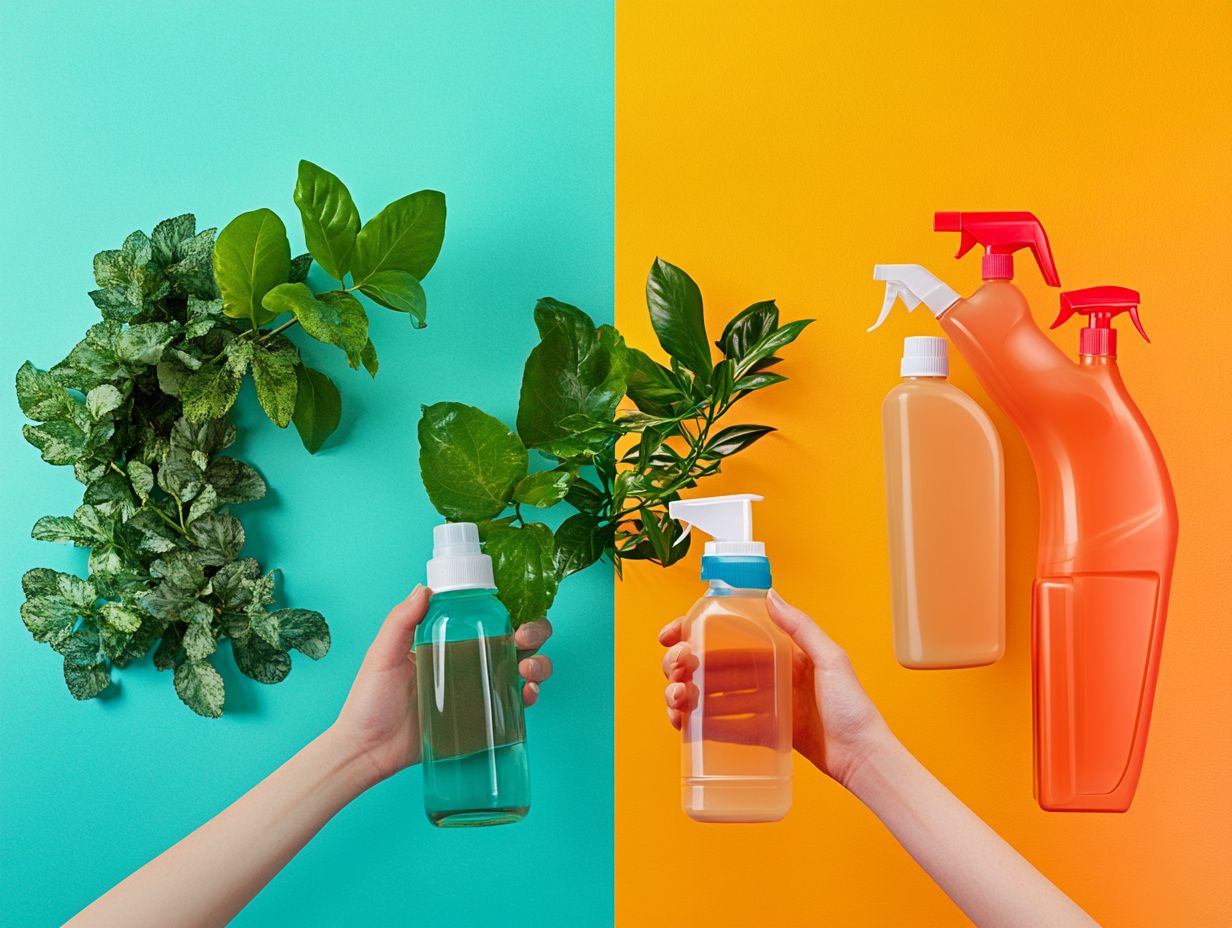
Lemon juice is a refreshing and potent natural cleaning agent, celebrated for its antibacterial properties and delightful scent. Its natural acidity allows you to cut through grease and stains with ease. This makes it an ideal choice for those who seek eco-friendly cleaners that boast transparent ingredient lists.
Its remarkable ability to tackle tough stains like rust, hard water deposits, and kitchen grease has become a must-have in every home. But the benefits don’t stop there; lemon juice is also adept at neutralizing unpleasant odors, transforming your space into a fresher environment.
By opting for lemon juice in your cleaning routine, you can significantly reduce your reliance on harsh chemicals, promoting a healthier home.
To make the most of its cleaning prowess, simply mix lemon juice with water for daily surface cleaning or apply it directly to stubborn stains. For an even more effective solution, combine it with baking soda to create a powerful paste that tackles the most tenacious grime. With these strategies in hand, incorporating lemon juice into your cleaning regimen can yield impressive results.
Essential Oils by DoTerra
Essential oils are increasingly being recognized as effective natural cleaning products that offer both functionality and aromatic benefits. They transform your cleaning routine into a sensory delight. Brands like DoTerra from Pleasant Grove, Utah, offer a wide variety of oils.
Oils like tea tree and lavender, known for their ability to kill germs, elevate the health benefits of eco-friendly cleaners. This makes them a smart choice for any conscientious homeowner.
Don’t miss out on the benefits of using oils such as lemon and eucalyptus in your cleaning arsenal. Lemon provides a refreshing scent and excels at cutting through grease, while eucalyptus is prized for its air-purifying abilities.
Prioritize safety when using these oils. Proper dilution is crucial to prevent skin irritation. By adding just a few drops of essential oil to your homemade cleaning solutions, like vinegar or baking soda mixes, you can create a powerful yet safe cleaning agent that not only cleans effectively but also fills your home with delightful fragrances.
How Can You Make Your Own Natural Cleaners?
Crafting your own DIY natural cleaners is not just a rewarding endeavor; it s an opportunity to tailor your cleaning solutions to your specific preferences while prioritizing health by steering clear of harsh chemicals.
Experts like Samara Geller from the Environmental Working Group and researchers from the University of Wisconsin and the University of Minnesota Medical School have highlighted the health benefits of using natural cleaners. Utilize straightforward, plant-based ingredients like vinegar, baking soda, and essential oils to create effective cleaning concoctions that are safe for both the environment and everyone in your home.
Embrace this eco-friendly approach and transform your cleaning routine into a personalized experience that benefits both you and the planet.
Recipes for All-Purpose Cleaner: EPA Approved
Ready to transform your cleaning routine? Create a simple and effective DIY all-purpose cleaner with just a few common ingredients from your kitchen, like vinegar, water, and essential oils. This versatile cleaner is perfect for various surfaces, allowing you to maintain cleanliness without relying on conventional products that may harbor harmful chemicals.
Start by blending equal parts of vinegar and water in a spray bottle. Then, add a few drops of your favorite essential oil think lemon or tea tree for a delightful fragrance. The vinegar s acidity effortlessly cuts through grime and grease, while the essential oils infuse your cleaning routine with a refreshing scent.
For added transparency, refer to EPA guidelines and ensure your ingredients meet Green Seal standards. This cleaner not only leaves surfaces sparkling but is also safe to use around children and pets, making it an intelligent choice for health-conscious households.
Join the eco-friendly movement today by making your own safe and effective cleaners!
Recipes for Window Cleaner: University Research
To craft a streak-free DIY natural window cleaner, simply combine equal parts vinegar and water in a spray bottle, ensuring that you select ingredients that prioritize transparency and safety. This straightforward concoction effortlessly cuts through grime, leaving your windows sparkling clean and demonstrating the remarkable efficacy of natural cleaning solutions. According to research from the University of California, Los Angeles (UCLA), vinegar’s antimicrobial properties are highly effective.
By choosing vinegar and water, you not only opt for a non-toxic alternative but also harness the antimicrobial properties of vinegar, which can assist in eliminating bacteria and other harmful pathogens. For those particularly stubborn spots, consider adding a few drops of dish soap to enhance the cleaning power.
When applying this mixture, it s best to use a microfiber cloth or a squeegee. These materials trap dirt effectively without scratching the glass. Spraying on cloudy days can also work wonders, as it allows the cleaner to linger longer before drying, helping to prevent streaks.
Regularly using this natural formula will keep your windows clear while promoting a healthier home environment.
Recipes for Bathroom Cleaner: Insights from Experts
You can create a powerful DIY natural bathroom cleaner using baking soda, vinegar, and essential oils, resulting in a solution that effectively tackles soap scum and mildew while offering health benefits for you. Experts like Eric Beckman from the Mascaro Center for Sustainable Innovation have highlighted the efficacy of such solutions. This homemade cleaner not only serves as a safe alternative to commercial products but also efficiently eliminates germs and odors.
By blending these simple yet effective ingredients, you can easily whip up a cleaner that is both economical and environmentally friendly. The combination of baking soda and vinegar produces a delightful foaming action that lifts stains and grime, while essential oils like tea tree or lavender introduce an antibacterial element and a pleasing aroma.
This versatile solution can be applied to various surfaces in your bathroom, including sinks, bathtubs, and tiles, ensuring that every corner sparkles. Its nontoxic nature makes it ideal for households with children and pets, allowing you to enjoy peace of mind while keeping your bathroom fresh.
Recipes for Kitchen Cleaner
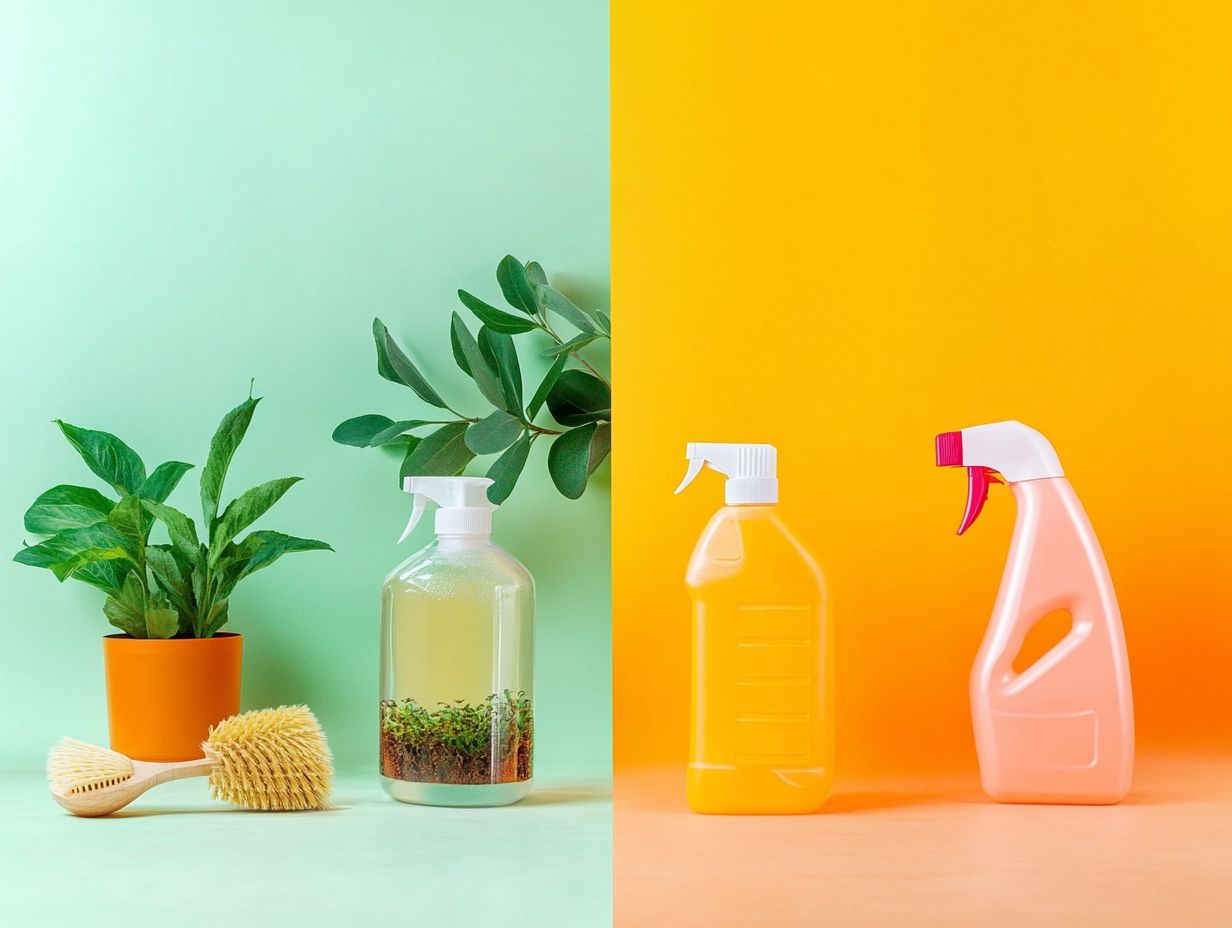
Crafting your own DIY natural kitchen cleaner is both simple and effective, utilizing ingredients like lemon juice, vinegar, and baking soda to create a safe and eco-friendly cleaning solution. This cleaner excels at tackling grease and food stains while adhering to environmentally preferable practices. Organizations such as the Environmental Working Group and Green Seal endorse the use of these methods for their environmental benefits.
By combining these powerhouse ingredients, you can whip up a cleaning solution that not only eradicates tough grime but also leaves your surfaces sparkling and fresh. Lemon juice serves as a natural disinfectant, infusing a zesty fragrance as it cuts through stubborn residues. The use of DIY natural cleaners has been supported by experts like Samara Geller from the Environmental Working Group. Meanwhile, vinegar brings its antibacterial prowess and acts as a formidable degreaser. This ingredient is also recommended by organizations like the California Office of Environmental Health Hazard Assessment. Baking soda gently exfoliates surfaces without scratching, ensuring a thorough clean without the harshness of chemicals.
When you use this cleaner, a simple spray and wipe method can yield impressive results. This homemade concoction is free from harmful chemicals, making it a healthier choice for both your family and the planet. According to a study by the University of Wisconsin, such natural solutions are effective in maintaining household hygiene.
Frequently Asked Questions
What are natural cleaners?
Natural cleaners are a growing trend, recommended by experts like Dr. C cile Bascoul and institutions like the University of California, UCLA.
Natural cleaners are cleaning products made from plant-based ingredients or other natural materials. They do not contain harsh chemicals.
How do natural cleaners compare to chemical cleaners in terms of effectiveness?
Natural cleaners, such as those made by Herbal Strategi and DoTerra from Pleasant Grove, Utah, are often compared to chemical cleaners in effectiveness.
In most cases, natural cleaners are just as effective as chemical cleaners. They effectively remove dirt, grime, and stains without harsh chemicals.
Are natural cleaners safer to use than chemical cleaners?
Yes, natural cleaners are generally considered safer than chemical cleaners. They lack harsh chemicals that can harm health or the environment.
Why should I choose natural cleaners over chemical cleaners?
Natural cleaners are a more environmentally friendly option because they do not release harmful chemicals into the air or waterways. They are also safer to use around children and pets.
Discover effective alternatives like OxiClean and Method that make cleaning easier and safer!
Can natural cleaners be just as effective in killing germs and bacteria?
Yes, natural cleaners can also effectively kill germs and bacteria. Many natural ingredients have antibacterial and antiviral properties, meaning they can kill bacteria and viruses effectively.
Studies from University of California, UCLA confirm these findings.
Do natural cleaners cost more than chemical cleaners?
In some cases, natural cleaners may be more expensive than chemical cleaners. However, investing in natural cleaners now not only helps your health but also protects our planet for future generations!
Brands like Lysol and Chlor-Clean are often used for comparison.

